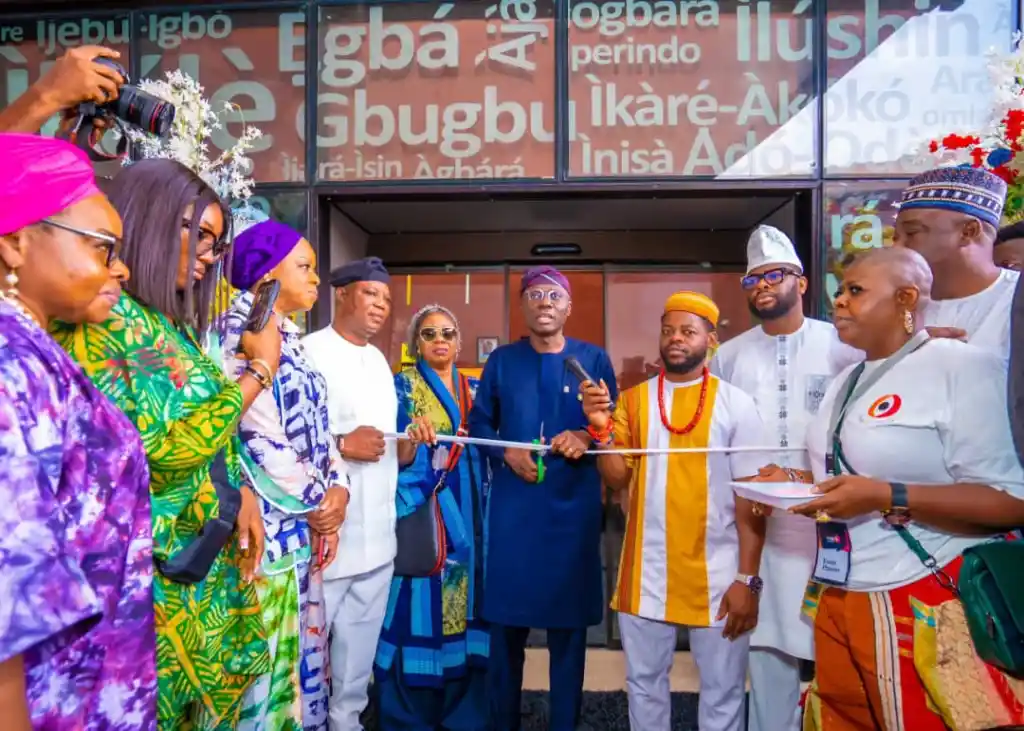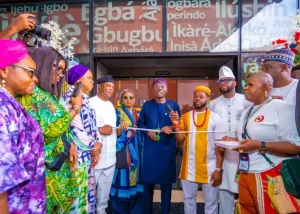
SANWO-OLU DECLARES J. RANDLE CENTRE FOR YORUBA CULTURE OPEN FOR PUBLIC USE

Lagos State Governor, Mr. Babajide Olusola Sanwo-Olu, has stated that the John Randle Centre for Yoruba Culture and History in Onikan, which his administration constructed and equipped, is now fully operational and open to the public, particularly members of the creative sector and visitors.
During a conversation session at the Centre on Monday, the Governor introduced Mr Qudus Onikeku as CEO/Director, who would be in charge of overseeing and organising creative activities at the Centre alongside his staff.
Sanwo-Olu noted that Onikeku was chosen because of his worldwide experience, extensive cultural and artistic background, and dedication to creative development.
“For over a year, finding the right person to manage this Centre has been a challenge. We chose Qudus Onikeku because of his distinguished career in the creative field and to fulfil our promise of giving young talents opportunities to showcase their skills,” the Governor said.
Sanwo-Olu stated that the Centre represents the entire Yoruba race, not just Lagos, including Nigeria’s southwestern states and Yoruba-speaking populations around the world. He encouraged the British government and other countries to repatriate artefacts belonging to Lagos and the Yoruba people.
READ ALSO:
LAGOS GOVT SETS AGENDA FOR SAFETY OF LIVES AT DREDGING, MINING SITES
The Governor also urged his colleagues in the southwestern region to view the Centre as a shared cultural institution and to contribute artefacts to help establish it as a prominent museum chronicling the Yoruba history and culture.
During the session, conducted by Qudus Onikeku, Sanwo-Olu urged the youths to explore the Centre in order to develop and showcase their creative abilities. He also urged parents and members of the Yoruba community to aggressively promote the culture and language in order to keep it alive for future generations.
Governor Sanwo-Olu underlined that the State Government is not seeking to control the tourist and entertainment sectors, but rather to create an enabling climate for creative practitioners to thrive, thereby transforming Lagos into a thriving tourism and entertainment destination.
He highlighted his administration’s actions for creative practitioners in the cinema, arts, and fashion sectors, as well as collaborations and sponsorships that benefited the industry.
Sanwo-Olu expressed his administration’s desire to encourage innovative brains, but insisted that recipients of his administration’s help demonstrate their deservingness, since the government expected value-added contributions in return.
“We want our people to come up with innovative ideas that will positively project Lagos to the international community. Once a creative idea is conceived, securing funding for outstanding initiatives won’t be difficult,” he stated.
Speaking on one of the ways to further improve and develop the State’s tourism and entertainment sector, Governor Sanwo-Olu said the development of an annual tourism calendar is important to guide both local and international tourists and drive traffic to Lagos State.
He saw this as a strategic move to highlight the state’s rich cultural heritage, festivals, events, and leisure activities in a systematic and predictable way.
Mr. Governor stated that the tourism calendar would help boost the tourism and entertainment sectors by allowing potential visitors and industry stakeholders to plan their trips and investments around scheduled events, resulting in economic growth and enhancing the state’s reputation as a premier tourism and entertainment destination in Nigeria.
Mrs. Toke Benson-Awoyinka, Commissioner for Tourism, Arts, and Culture, told visitors in her welcome address that the Centre would be a dynamic environment where traditional music, creativity, and historical narratives would come to life, instilling a strong feeling of connection and pride.
She noted that the John Randle Centre is about more than just preserving culture; it is also about stimulating creativity and enabling young people to engage with and reinterpret Yoruba tradition in contemporary ways.
“This Centre’s establishment was made possible through the collaborative efforts of artisans, historians, educators, and community leaders, embodying a collective vision of unity and appreciation for our shared cultural identity,” she said.
